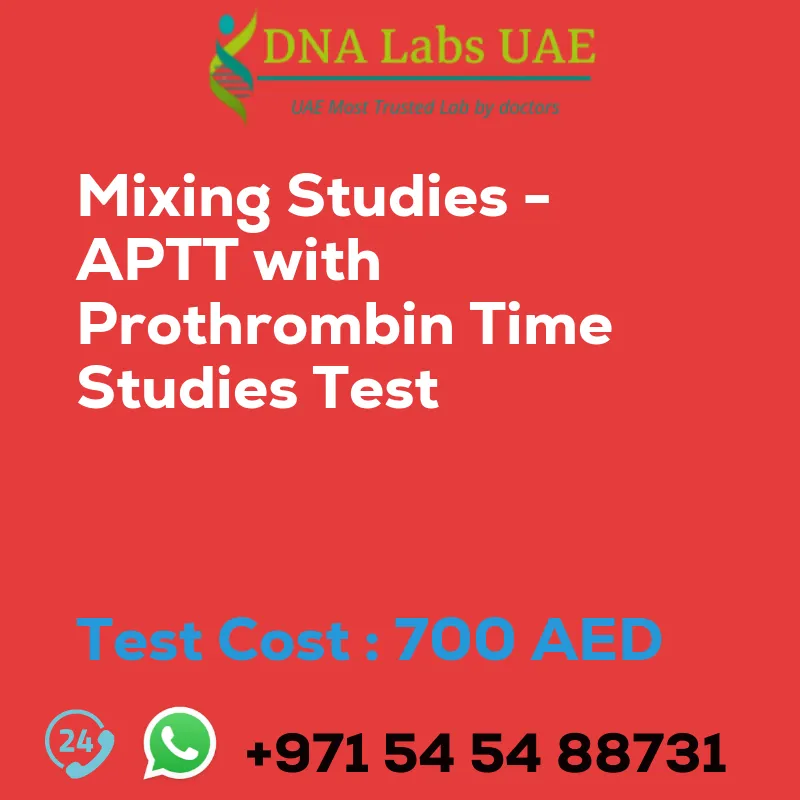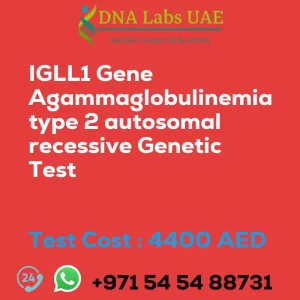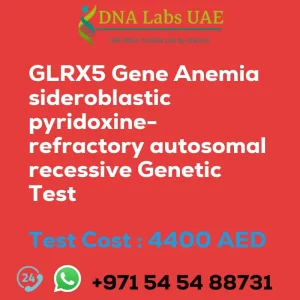MIXING STUDIES – APTT WITH PROTHROMBIN TIME STUDIES Test
Test cost: 700.0 AED
Test Components:
- Prothrombin Time
- APTT
- Thrombin Time
- Fibrinogen
- Mixing studies
Sample Condition:
6 mL whole blood in 2 Blue Top (Sodium Citrate) tubes. Mix thoroughly by inversion. Transport to Lab within 4 hours. If this is not possible, make PPP within 1 hour of collection as follows: Centrifuge sample at 3600 rpm for 15 min. & transfer supernatant to a clean plastic tube. Centrifuge this supernatant again at 3600 rpm for 15 min. & finally transfer the supernatant (PPP) to 1 labelled clean plastic screw capped vial. FREEZE IMMEDIATELY. Ship frozen. DO NOT THAW. Overnight fasting is preferred. Duly filled Coagulation Requisition Form (Form 15) is mandatory.
Report Delivery:
Sample – Wed / Sat by 11 am; Report – Thu / Mon
Method:
Photo-optical Clot Detection
Test type:
Disorders of Coagulation
Doctor:
Hematologist
Test Department:
Pre Test Information
Overnight fasting is preferred. Duly filled Coagulation Requisition Form (Form 15) is mandatory. It is recommended that the patient discontinues Heparin for 1 day and Oral Anticoagulants for 7 days prior to sampling as these drugs may affect test results. Discontinuation should be with prior consent from the treating Physician.
Test Details:
Mixing studies are laboratory tests used to evaluate the presence of a coagulation factor deficiency or an inhibitor in the blood. These tests involve mixing the patient’s plasma with normal plasma and measuring the resulting clotting time.
One commonly performed mixing study is the mixing of activated partial thromboplastin time (APTT) with prothrombin time (PT) studies. APTT measures the intrinsic pathway of coagulation, which is primarily affected by deficiencies or inhibitors of factors VIII, IX, XI, or XII. PT, on the other hand, assesses the extrinsic pathway of coagulation, mainly influenced by factors II, V, VII, and X.
To perform the mixing study, the laboratory technician first collects the patient’s plasma sample and performs an APTT test. If the APTT is prolonged, indicating a potential coagulation factor deficiency or inhibitor, the technician then mixes the patient’s plasma with an equal volume of normal plasma and repeats the APTT test. If the clotting time normalizes, it suggests a factor deficiency. However, if the clotting time remains prolonged, it suggests the presence of an inhibitor.
After performing the mixing study with APTT, the technician can also perform a mixing study with PT if necessary. The same principle applies, where the patient’s plasma is mixed with normal plasma, and the PT test is repeated. If the clotting time normalizes, it indicates a factor deficiency, while a prolonged clotting time suggests an inhibitor.
Mixing studies, including APTT with PT studies, are essential in diagnosing and differentiating between coagulation factor deficiencies and inhibitors. The results help guide further diagnostic testing and treatment decisions for patients with bleeding disorders.
| Test Name | MIXING STUDIES – APTT WITH PROTHROMBIN TIME STUDIES Test |
|---|---|
| Components | *Prothrombin Time*APTT*Thrombin Time *Fibrinogen*Mixing studies |
| Price | 700.0 AED |
| Sample Condition | 6 mL whole blood in 2 Blue Top (Sodium Citrate) tubes. Mix thoroughly by inversion. Transport to Lab within 4 hours. If this is not possible, make PPP within 1 hour of collection as follows: Centrifuge sample at 3600 rpm for 15 min. & transfer supernatant to a clean plastic tube. Centrifuge this supernatant again at 3600 rpm for 15 min. & finally transfer the supernatant (PPP) to 1 labelled clean plastic screw capped vial. FREEZE IMMEDIATELY. Ship frozen. DO NOT THAW. Overnight fasting is preferred. Duly filled Coagulation Requisition Form (Form 15) is mandatory. |
| Report Delivery | SampleWed / Sat by 11 am; Report Thu / Mon |
| Method | Photo-optical Clot Detection |
| Test type | Disorders of Coagulation |
| Doctor | Hematologist |
| Test Department: | |
| Pre Test Information | Overnight fasting is preferred. Duly filled Coagulation Requisition Form (Form 15) is mandatory. It is recommended that patient discontinues Heparin for 1 day and Oral Anticoagulants for 7 days prior to sampling as these drugs may affect test results. Discontinuation should be with prior consent from the treating Physician. |
| Test Details |
Mixing studies are laboratory tests used to evaluate the presence of a coagulation factor deficiency or an inhibitor in the blood. These tests involve mixing the patient’s plasma with normal plasma and measuring the resulting clotting time. One commonly performed mixing study is the mixing of activated partial thromboplastin time (APTT) with prothrombin time (PT) studies. APTT measures the intrinsic pathway of coagulation, which is primarily affected by deficiencies or inhibitors of factors VIII, IX, XI, or XII. PT, on the other hand, assesses the extrinsic pathway of coagulation, mainly influenced by factors II, V, VII, and X. To perform the mixing study, the laboratory technician first collects the patient’s plasma sample and performs an APTT test. If the APTT is prolonged, indicating a potential coagulation factor deficiency or inhibitor, the technician then mixes the patient’s plasma with an equal volume of normal plasma and repeats the APTT test. If the clotting time normalizes, it suggests a factor deficiency. However, if the clotting time remains prolonged, it suggests the presence of an inhibitor. After performing the mixing study with APTT, the technician can also perform a mixing study with PT if necessary. The same principle applies, where the patient’s plasma is mixed with normal plasma, and the PT test is repeated. If the clotting time normalizes, it indicates a factor deficiency, while a prolonged clotting time suggests an inhibitor. Mixing studies, including APTT with PT studies, are essential in diagnosing and differentiating between coagulation factor deficiencies and inhibitors. The results help guide further diagnostic testing and treatment decisions for patients with bleeding disorders. |







